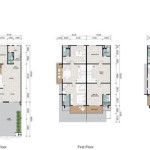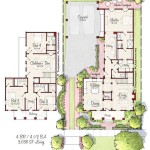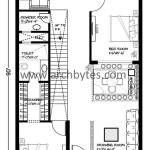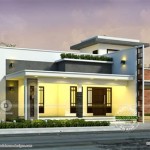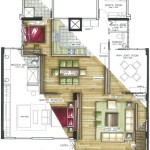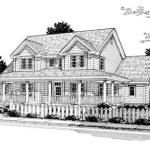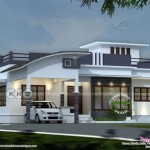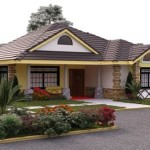Small House On Stilts Plans: Design, Benefits, and Construction Considerations
The construction of small houses on stilts, also known as pile dwellings, is an architectural approach that offers numerous advantages, particularly in specific environmental and geographical contexts. These structures, elevated above ground level, are increasingly gaining popularity due to their resilience, sustainability, and adaptability. This article provides a comprehensive overview of small house on stilts plans, encompassing design considerations, benefits, and essential construction aspects.
Understanding the Advantages of Elevated House Designs
Building a small house on stilts provides a suite of advantages when compared to traditional slab-on-grade construction. These benefits range from environmental protection to enhanced living conditions, making this design choice appropriate for diverse settings.
One of the primary advantages is flood mitigation. In areas prone to flooding, elevating the house prevents water from directly impacting the living space and structural components. This drastically reduces the risk of water damage, mold growth, and costly repairs after flood events. The stilt system effectively lifts the dwelling above the potential flood zone, protecting the inhabitants and their belongings.
Secondly, stilts offer enhanced ventilation and moisture control. Elevating the house creates an air gap beneath the structure, facilitating natural airflow. This ventilation helps to reduce humidity levels, preventing the accumulation of moisture that can lead to rot, mildew, and pest infestations. In warm and humid climates, this natural ventilation can also contribute to a more comfortable indoor environment, potentially reducing the need for air conditioning.
Stilt construction also minimizes the impact on the surrounding environment. By elevating the house, significant ground disturbance is avoided. This is particularly important in environmentally sensitive areas, such as wetlands or coastal regions. The stilts allow for the preservation of natural vegetation and drainage patterns, minimizing the ecological footprint of the construction project.
Furthermore, building on stilts can offer improved views and enhanced security. The elevated position provides panoramic views of the surrounding landscape, creating a more aesthetically pleasing living environment. The height also presents a deterrent to potential intruders, enhancing the security of the dwelling.
Key Design Considerations for Small House on Stilts Plans
Developing plans for a small house on stilts requires careful consideration of various factors, including site characteristics, structural integrity, and aesthetic appeal. A well-designed plan ensures the safety, functionality, and longevity of the structure.
Site analysis is a crucial first step. This involves assessing the soil conditions, slope, prevailing winds, and potential environmental hazards. The soil type will determine the appropriate type and depth of foundation required for the stilts. The slope of the land will influence the stilt height and the overall design of the house. Understanding the prevailing winds will inform the orientation of the house to maximize natural ventilation and minimize wind load. Finally, identifying any potential environmental hazards, such as flood zones or seismic activity, is essential for incorporating appropriate safety measures.
Structural engineering is paramount. The stilt system must be designed to withstand the anticipated loads, including the weight of the house, occupants, and furniture, as well as wind and seismic forces. The size, spacing, and material of the stilts will be determined by these load calculations. It is imperative to engage a qualified structural engineer to ensure the structural integrity and safety of the house.
Accessibility is another important consideration. Stairs or ramps will be required to access the elevated living space. The design of these access features should comply with building codes and accessibility standards, particularly if the house is intended for elderly or disabled individuals. The placement of the access features should also be carefully considered to maximize convenience and minimize obstruction of the surrounding landscape.
Finally, aesthetic design plays a significant role. The overall appearance of the house should be harmonious with the surrounding environment. The choice of materials, colors, and architectural style should reflect the local context and the preferences of the homeowner. The design should also consider the integration of outdoor living spaces, such as balconies or decks, to take advantage of the elevated position and the surrounding views.
Essential Construction Aspects of Elevated Small Homes
Constructing a small house on stilts requires a specialized approach, incorporating specific techniques and materials to ensure the stability, durability, and longevity of the structure. Adhering to best practices and building codes is essential for a successful project.
Foundation construction is the cornerstone of the project. The type of foundation used for the stilts will depend on the soil conditions and the load requirements. Common foundation types include concrete piers, driven piles, and screw piles. Concrete piers are typically used in stable soil conditions, while driven piles are suitable for softer soils. Screw piles are an alternative that can be installed quickly and efficiently, even in challenging soil conditions. The foundation must be properly engineered and installed to provide a solid and level base for the stilts.
Stilt selection and installation are crucial. Stilts can be made from various materials, including wood, steel, and concrete. Wood stilts are often used for smaller houses, while steel and concrete stilts are preferred for larger or more demanding projects. The stilts must be properly treated to resist decay and corrosion. The installation process involves setting the stilts plumb and level and securely attaching them to the foundation. The spacing between the stilts will depend on the load requirements and the design of the house.
Framing and enclosure should be carefully planned. The framing of the house must be designed to withstand the loads imposed by the elevated position and the surrounding environment. This may involve using engineered lumber or additional bracing to enhance the structural integrity. The enclosure of the house should be designed to provide adequate insulation and weather protection. This may involve using high-performance windows and doors, as well as insulation materials with a high R-value.
Utility connections require special attention. Water, sewer, and electrical lines must be properly routed and connected to the house, taking into account the elevated position and the potential for movement. Flexible connections may be necessary to accommodate any settling or shifting of the structure. The utility lines should be protected from damage and insulated to prevent freezing in cold climates. Regular inspections and maintenance are essential to ensure the continued safe and reliable operation of the utilities.
Finally, compliance with building codes and regulations is paramount. Before starting construction, it is essential to obtain all necessary permits and approvals from the local authorities. The construction process must comply with all applicable building codes and regulations, ensuring the safety and quality of the house. Regular inspections by building inspectors are necessary to verify compliance and ensure that the house is built to code.
In summary, constructing a small house on stilts requires meticulous planning and execution. The benefits of flood mitigation, enhanced ventilation, and minimal environmental impact make this an attractive option. However, it is essential to address the unique design and construction challenges to ensure a safe, durable, and aesthetically pleasing dwelling. By carefully considering site conditions, structural requirements, and construction techniques, a small house on stilts can provide a comfortable, sustainable, and resilient living environment.

Tiny House Plan On Stilts 44180td Architectural Designs Plans

Piling Elevated Stilt And Pier Small House Plans Coastal

Family S 576 Sq Ft Stilt Beach House

House On Stilts Stilt Plans Beach Cottage

Modern Resort Type House With Stilt Concept Pinoy Eplans

Home Plan Ch464

Lofty Design Ideas For Tiny Homes On Stilts The Life

House Design Plan Ch539 3 Stilt Plans On Stilts Carriage

Home Plan Ch536

Lofty Design Ideas For Tiny Homes On Stilts The Life

